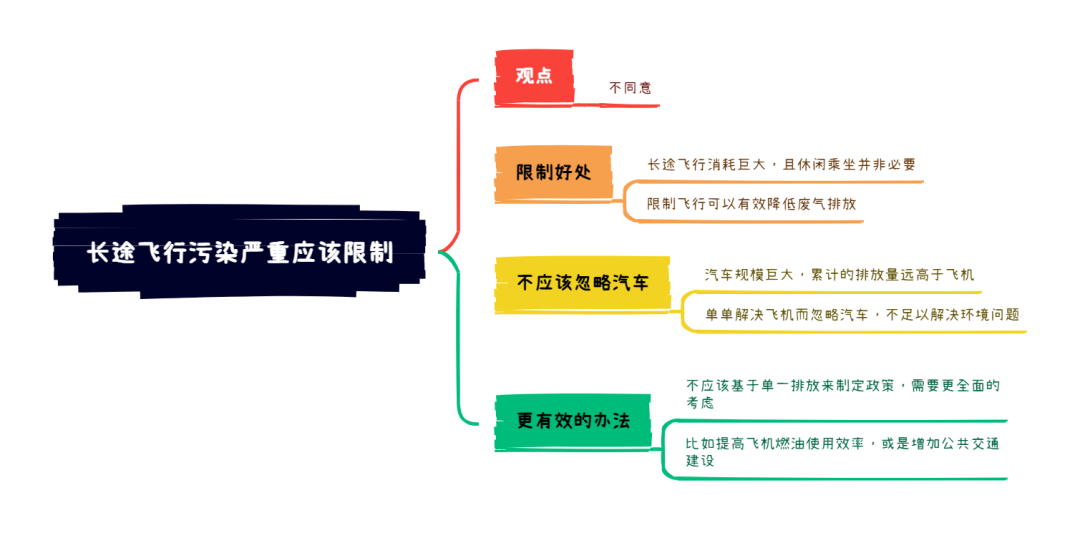观点类大作文,环境类话题
One long-distance flight consumes fuel which a car uses in several years' time, but they cause the same amount of pollution. So some people think that we should discourage non-essential flights, such as tourist travel, rather than to limit the use of cars. To what extent do you agree or disagree with this view?
题目来源:2024年12月8日大陆雅思大作文(重复2008年4月5日大陆考题
1、题目大意
一次长途飞行消耗的燃料相当于一辆汽车在几年内使用的燃料,但它们造成的污染量相同。因此,有些人认为我们应该阻止非必要的航班,如旅游,而不是限制汽车的使用。你在多大程度上同意或不同意这一观点?
2、思路解析
这是一道观点类大作文,聊的是取消非必要航班飞行的问题,常见的交通环保话题,但是审题时需要注意很多细节。一是,第一句话是背景句,不需要做论证。二是观点句中包含了比较关系,“限制非必要航班”和“限制汽车”,因此在论证时双方都要涉及。下面,老师带大家来一起看下具体观点。
先来看赞同的角度,有两方面。
一方面非必要航班的需求多为奢侈性消费。旅游航班往往是人们为了娱乐和享受而选择的,并不涉及日常生活的基本需求。相比之下,汽车更多用于通勤和生活所需,限制航班对人们生活质量的直接影响较小,更具有可操作性。
另一方面环保效果更明显。政府可以通过提高航班税费、减少旅游航班数量等方式有效减少航班数量,比大规模减少汽车使用更具可行性,从而更快缓解气候变化的恶化。
再来看反对的角度,同样有两方面。
一方面,汽车数量多,累积污染更大。尽管单次航班的污染更严重,但汽车的普及率远高于航班,且每天排放的污染量累积起来更加显著。因此,限制汽车的使用会对整体环境保护产生更大的长期效果,尤其是在人口密集的城市地区。
另一方面,限制长途飞行可能会影响经济和社会发展。长途飞行不只是为了旅游,也承载着国际商务往来、学术交流、跨国会议与艺术巡展等功能。若对非必要航班实施严格限制,将可能间接影响国际间的商业和文化活动。
3、提纲

4、高分范文示例
In recent years, the environmental impact of transportation has become a topic of increasing concern. While some argue that we should discourage non-essential flights, such as those for tourism, in favor of limiting car use, I believe this perspective is misguided. In my view, focusing solely on reducing air travel is not the most effective solution to combat pollution and climate change.
Admittedly, long-distance flights are extraordinarily energy-intensive, and the emissions they generate per journey are substantial. Given that millions of people undertake non-essential flights for leisure, it may seem logical to target these practices first. Such a strategy appears to promise swift, visible results: reducing the frequency of unnecessary flights could, in theory, lower greenhouse gas emissions in a relatively short timeframe. Moreover, discouraging non-essential air travel could raise public awareness, compelling individuals to reconsider their holiday choices and prompting airlines to invest in cleaner technologies and more efficient operations.
However, this line of reasoning overlooks the systemic and pervasive nature of car dependency. Even though an individual flight might outstrip a single car’s annual carbon output, the sheer scale of road transport worldwide dwarfs the frequency of long-haul flights. Private vehicles are not only ubiquitous, but they also operate continuously, day after day. Small though their per-trip emissions may be when compared to a plane, the cumulative impact of billions of car journeys-commutes, short-haul errands, and intercity travel - cannot be understated. Cars contribute significantly to urban smog, congestion, and resource depletion, making it imprudent to dismiss them as a lesser environmental concern. Restricting only air travel without addressing automobile reliance would neglect a critical source of long-term pollution and resource consumption.
Ultimately, effective environmental policy must not hinge on a simplistic comparison between two modes of transport based solely on fuel usage or a single snapshot of emissions. Instead, policymakers and societies should adopt a holistic perspective that considers both frequency and scale of use. Measures could include investing in cleaner aviation fuels and more efficient aircraft designs, while simultaneously promoting public transportation, cycling infrastructure, and electric vehicle adoption. Only by tackling both the macro-level harm of pervasive car use and the disproportionate impact of certain types of flights can we hope to achieve a balanced and enduring reduction in our collective carbon footprint.
In conclusion, while air travel does contribute to pollution, limiting non-essential flights is not the most effective approach. A more comprehensive strategy, including improving fuel efficiency and promoting sustainable transportation options, would provide a more balanced solution to the environmental challenges we face.
5、相关词汇和语法结构
environmental impact环境影响
increasing concern日益关注
non-essential flights非必要的航班
limiting car use限制汽车使用
combat pollution抵制污染
climate change气候变化
energy-intensive能源密集型的
emissions per journey每次旅程排放的气体
target these practices针对这些做法
visible results明显的结果
public awareness公众意识
reconsider holiday choices重新考虑假期选择
invest in cleaner technologies投资于更清洁的技术
more efficient operations更高效的操作
systemic nature系统性特征
car dependency对汽车的依赖
cumulative impact累积影响
urban smog城市雾霾
resource depletion资源枯竭
holistic perspective整体视角








